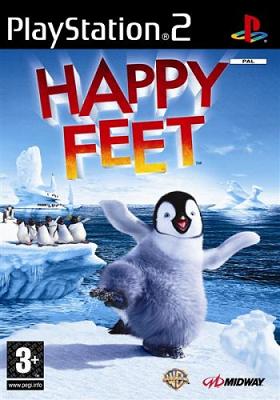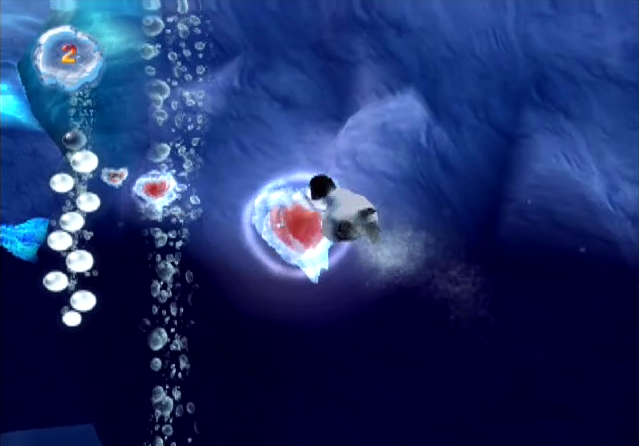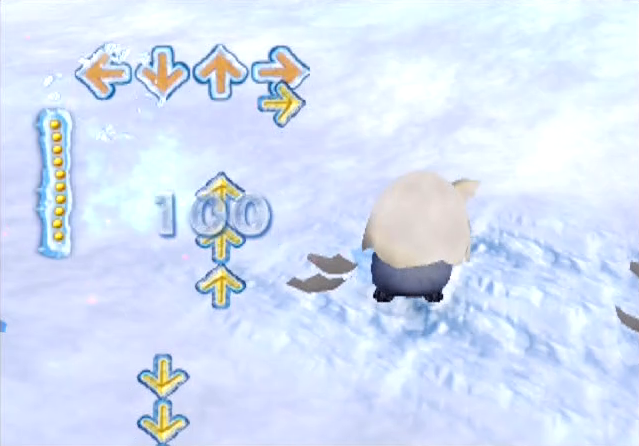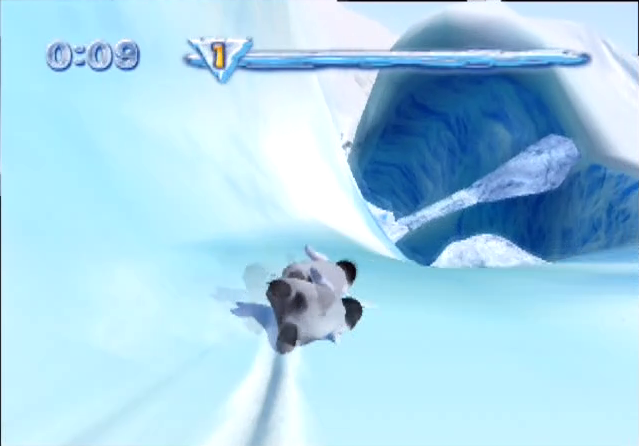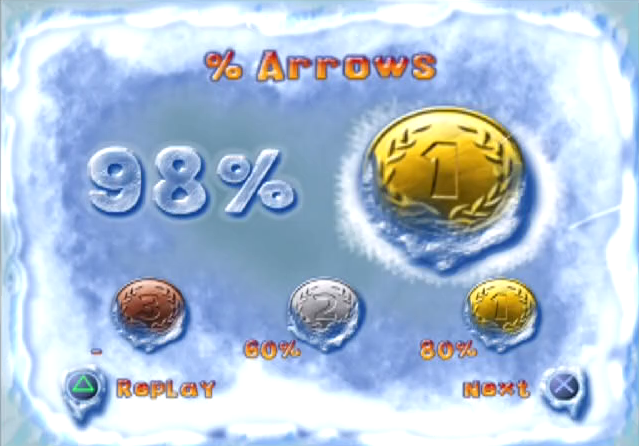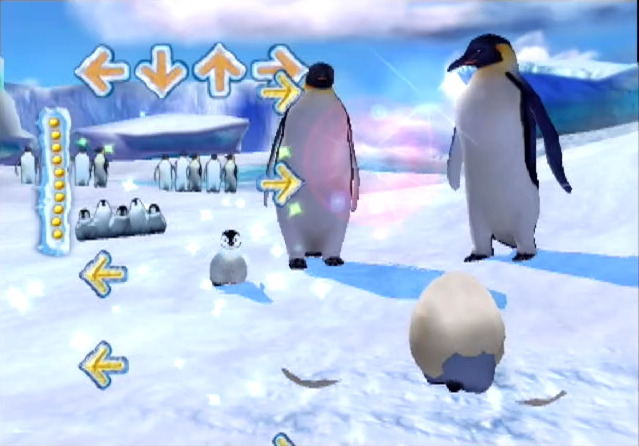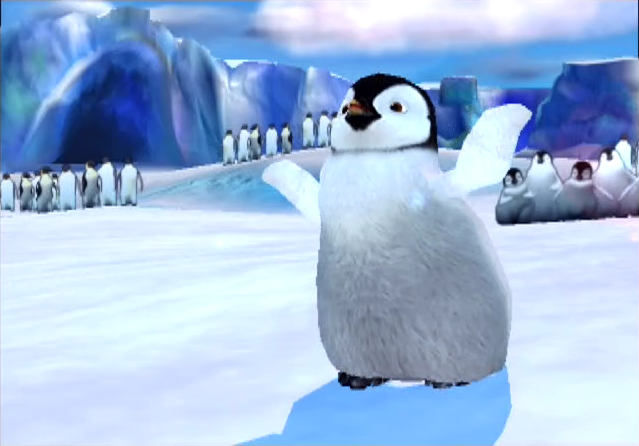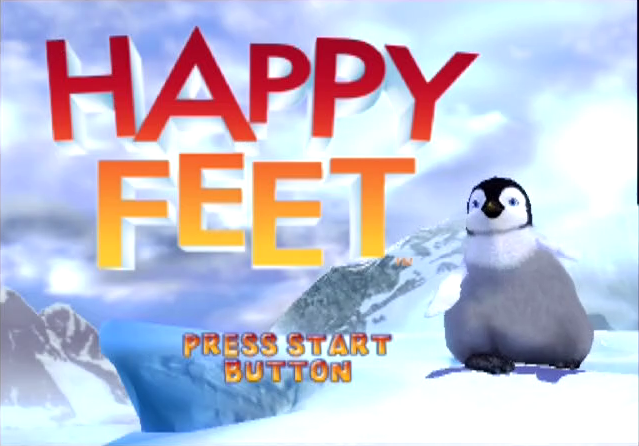HAPPY FEET (PS2)
Happy Feet is a prime example of the depressing corporate reality that faces many 21st Century licensed video games. Its build, production and presentation are all acceptable enough, but though there’s nothing especially horrendous about A2M’s penguin adventure, it remains difficult to recommend after setting its ambitions so lamentably low.
Based on the 2006 family film of the same name, Happy Feet pits you as the penguin Mumble, in an adventure spanning 33 levels that chiefly flit between three styles of play. Easily the best are the music/rhythm sections; owing a considerable debt of gratitude to nineties living-room party simulator Dancing Stage, players are met with a flood of directional arrows that must be met ‘n’ matched with cohesion and timing as they flow up the screen, whilst the penguins engage in a rather grand music-video style interpretation of events in the background. It’s unashamedly dated and a very straightforward interpretation of Konami’s dance titles, but it works well enough, and offers a quirky kind of fun that’s easy to appreciate. Certainly, watching a troop of Emperor penguins harmonising to Queen’s “Somebody to Love” or stomping along to Dee-Lite’s “Groove is in the Heart” can’t help but raise a smile.
Based on the 2006 family film of the same name, Happy Feet pits you as the penguin Mumble, in an adventure spanning 33 levels that chiefly flit between three styles of play. Easily the best are the music/rhythm sections; owing a considerable debt of gratitude to nineties living-room party simulator Dancing Stage, players are met with a flood of directional arrows that must be met ‘n’ matched with cohesion and timing as they flow up the screen, whilst the penguins engage in a rather grand music-video style interpretation of events in the background. It’s unashamedly dated and a very straightforward interpretation of Konami’s dance titles, but it works well enough, and offers a quirky kind of fun that’s easy to appreciate. Certainly, watching a troop of Emperor penguins harmonising to Queen’s “Somebody to Love” or stomping along to Dee-Lite’s “Groove is in the Heart” can’t help but raise a smile.
Some of the mini-games are more engaging than others: the dance bits will amuse fans of the Dance Dance Revolution games
Unfortunately, the other two disciplines are rather dull. Steering Mumble down some icy slopes presents some invitingly rapid action to begin with, but increasingly samey layouts and a general paucity of hazards mean they start to lose impetus pretty quick. The less said about the underwater sections the better; if the slopes see Mumble heading toward collectibles, then the underwater bits see collectibles headed towards him. Again, whilst the few bits ‘n’ bobs that need to work for these sections generally do, there’s so little imagination to them it’s embarrassing. One level sees you collecting ‘lovestone’ icons, another is almost identical only it’s ‘shrimp’. Same pony, different ribbon.
We could make excuses all day about the limits placed on developers in such projects, but at the end of the day it’s a game Warner Bros. deemed a suitable enough counterpart to their big-screen venture, and the money the gamer has to fork-out for it is just as real as for any other title on the market. So the question is, what perks does it offer the consumer?
We could make excuses all day about the limits placed on developers in such projects, but at the end of the day it’s a game Warner Bros. deemed a suitable enough counterpart to their big-screen venture, and the money the gamer has to fork-out for it is just as real as for any other title on the market. So the question is, what perks does it offer the consumer?
Well, nothing major if we’re honest, but it isn’t all bad. For starters, though Happy Feet represents little more than a fleeting challenge for seasoned gamers, a surprisingly bulky 33 levels should keep newcomers busy for a bit, whilst a medal system encourages players to better their performances with a view to unlocking some extras, which admittedly revolve exclusively around non-gameplay versions of the music levels. The visuals are alright too. It loses a few marks for a chronic lack of variety, but the shimmering underwater locales, blustery mountain-top tundras and elaborate music/celebration scenes are all perfectly acceptable. Though collision-parameters leave a bit to be desired and some of the background animations are a bit cheap, the penguin models are really good and on the whole, Happy Feet runs smoothly.
Sound follows along much the same lines. The music is well-pitched, with a fun and rather eclectic mix of pop songs to bop along to, whilst the gags ‘n’ sidekicks play their part and a good number of the film’s actors reprise their voicing roles. They’re most pretty good too, though Elizabeth Daly ensures that Young Mumble ends up as yet another doppelganger for Tommy from Rugrats (she’s not quite Nolan North when it comes to market saturation, but probably not far off) whilst Elijah Wood’s dialogue, perhaps unsurprisingly, bears all the hallmarks of an actor who didn’t quite have his heart in the project.
Sound follows along much the same lines. The music is well-pitched, with a fun and rather eclectic mix of pop songs to bop along to, whilst the gags ‘n’ sidekicks play their part and a good number of the film’s actors reprise their voicing roles. They’re most pretty good too, though Elizabeth Daly ensures that Young Mumble ends up as yet another doppelganger for Tommy from Rugrats (she’s not quite Nolan North when it comes to market saturation, but probably not far off) whilst Elijah Wood’s dialogue, perhaps unsurprisingly, bears all the hallmarks of an actor who didn’t quite have his heart in the project.
Mind you, he can be forgiven for that. Whilst it’s hard to hate anything Happy Feet puts before you, mediocrity is an all-too-comfortable state of mind for a game that reflects competent development but zero vision, thus the end credits will likely be met with an almighty ‘meh’. Twenty years ago, Disney licences such as Aladdin and Castle of Illusion were busy proving that games aimed at a younger audience could be ace in their own right. The notion that a game can somehow justify lazy design and low ambitions based on the age of its intended audience doesn’t (and never will) wash, and as such, when you strip away the gloss and the marketing allure of familiar characters, Happy Feet is just another cash-cow. Buy the youngsters something more worthy of their time, and your money.
